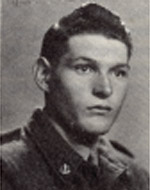Topelberg, Reuven (Robert)
Reuven, the son of Esther and Moshe-Michael, was born on February 22, 1937, in Brussels, the capital of Belgium, to Dvora, where his father ran a men’s clothing store, and attended an elementary school in his hometown. The Jews of Brussels were involved in economic and political activities and operated welfare organizations, public associations, trade unions, etc. During the Nazi invasion of World War II, the Jews of Brussels, On May 10, 1940, anti-Jewish decrees were issued in Belgium, and Jews were fired from their public posts The community services operated by the Jewish community in Brussels collapsed and the city was in chaos, and the Jewish welfare organization dealt with thousands of needy people, and the Zionist youth movements focused on the fields of education and culture and initiated resistance activities. The “final solution” to Belgian Jewry began in the spring of 1942. In June, thousands of Jews were forced to work for forced labor, and later were sent to extermination. The deportations of Belgian Jews continued until September 1943, when most of the deportees perished in Auschwitz. Many Jews were active in the Belgian underground. Some 29,000 Belgian Jews perished in the war. Reuven’s parents and younger sister were taken to the camp and destroyed in crematoria. Only he survived, was picked up by his relatives and held out until liberation. In 1948, at the age of 11, he was brought to Israel by Youth Aliyah and enrolled in the religious youth village in Kfar Hasidim, in the Zebulun Valley. He completed his studies at the local agricultural school and received a diploma. Reuven stood out in his love for sport, and excelled in running and jumping high and long. After completing his studies he moved to Kibbutz Ein Harod Ihud. He spent the days of Shabbat and all his vacations with relatives in Tel Aviv, some of whom drew warmth and family love. At the beginning of October 1954, Reuven was drafted into the IDF and served in the Nahal Brigade. At the end of the War of Independence and the consolidation of the country’s borders, Nahal soldiers enlisted in the settlement areas and guarded the borders of the country in the barren, desolate areas of every infiltrator. Ein Radian in the southern Arava (now Yotvata) was one of the first outposts of the Nahal, and Reuven was one of the fighters in the area, and he became fond of all his friends and commanders thanks to his quiet and pleasant temperament, his joy and his faithfulness On the 17th of Elul 5706 (September 14, 1955) Reuven was taken to an eternal rest in the Kiryat Shaul military cemetery, where he was electrocuted to death at the basketball court in Kiryat Shaul, the last survivor of the Holocaust. Parents, brothers, sisters, sons and daughters), who experienced the Holocaust in the ghettos and / or concentration and extermination camps and / or in flight and in hiding In territories occupied by the Nazis and / or fighting alongside members of the underground movements or partisans in the Nazi-occupied territories who immigrated to Israel during or after World War II, wore uniforms and fell in the Israeli army.
